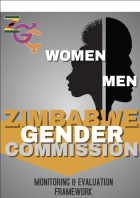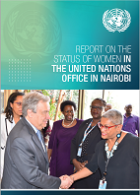21 - 33 of 33 Results
Pagination
Date:
The ZGC M&E Framework aims to guide gender programmes at the national level and provide guidance on Monitoring and Evaluation.
Date:
The Strategic Plan 2022–2025 will guide UN Women for the next four years—with an eye toward the 2030 deadline to achieve the Sustainable Development Goals. It articulates how UN Women will leverage its unique triple mandate to mobilize urgent and sustained action to achieve gender equality and the empowerment of all women and girls and support the achievement of the 2030 Agenda for Sustainable Development.
Date:
UN Women Kenya Annual report aims to share the results and lessons learned for 2020.
Date:
This continental study provides a contextual analysis of the forced displacement of women and girls in Africa based on first hand data from field visits made to the Central African Republic, Ethiopia, and Nigeria. The analysis provides the key priority considerations for the realisation of durable solutions for refugees, IDPs and returnees in Africa and makes recommendations for actions by the AU, Member States and relevant stakeholders within the context of AGA and APSA.
Date:
The newsletter aims to serve as an information-sharing platform to promote accelerated action for Gender Equality and Empowerment of Women (GEWE) in Africa. The newsletter features good practices, knowledge, and efforts by the AUC, ECA, and UN Women that help ensure Gender Equality and Empowerment of Women in Africa is sustained.
Date:
This global report provides a synthesis of the work of UN Women during 2020 to ensure a gender-sensitive response to the COVID-19 pandemic in ending violence against women, economic empowerment, leadership, gender data, and humanitarian contexts.
Date:
This report was produced by UN Women following the global digital consultation on the gendered dimensions of violent extremism and counterterrorism responses (25 May – 5 July 2020), organized on behalf of the Gender Working Group of the UN Global Counter-Terrorism Coordination Compact. It reflects the views expressed by civil society participants in the consultation, and it was presented to Member States ahead of the 7th UN Global Counter-Terrorism Strategy revision, 2021.
Date:
The report provides an assessment of progress made by the 2019 UNCT in Ethiopia in mainstreaming gender in the UNDAF cycle of (2016-2020) and makes concrete recommendations on how the identified gaps can be improved.
Date:
The ten knowledge products provide practical, evidence-based guidance for UN Women staff in various programming areas and organizational priorities such as Women’s Leadership and Political Participation, Violence against Women, Women Economic Empowerment, Resource Based Management (RBM), Resource Mobilization, Partnerships, Women in Humanitarian Action among others.
Date:
A statistical analysis based on existing data sources of gender inequality in Ethiopia.
Date:
The 2017 Status of Women in the UN Duty Station in Nairobi report was commissioned by UN Women’s Regional Office for East and Southern Africa (UN Women ESARO), at the request of the Network of Women Leaders in the UN Nairobi Duty Station to inform efforts to support the realisation of the System-wide Strategy on Gender Parity which was launched by the UN Secretary-General António Guterres on 13 September 2017.
Date:
UN Heads of Agencies Visit to a Sanctuary for Women in Adama, Ethiopia
Date:
UN Women Eastern and Southern Africa Regional newsletter of April 2016 The highlights of this issue: Transformational Leadership Training Equips Ethiopian Women to Transform Institutions:The Story of Mrs. Fikre Mulugeta of Ahmara Regional Council Uganda agrees on Gender Statistics to accelerate Sustainable Development Goals Implementation UN Women and Africa UNiTE Launch “Violence Thrives in our Silence” Documentary The Time is NOW: High Level Panel on...













